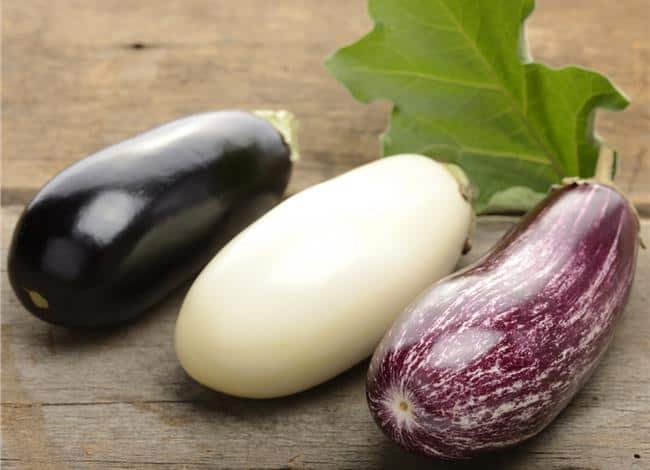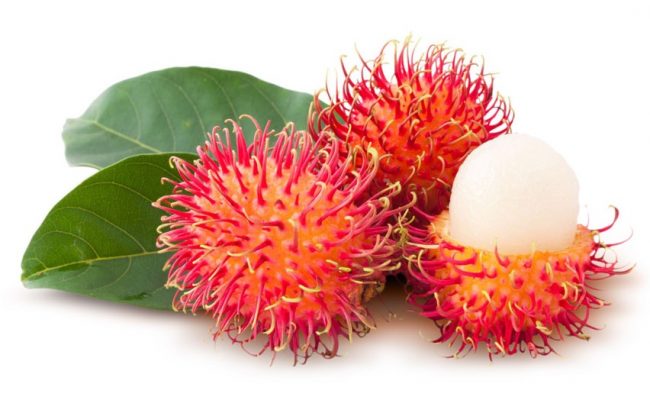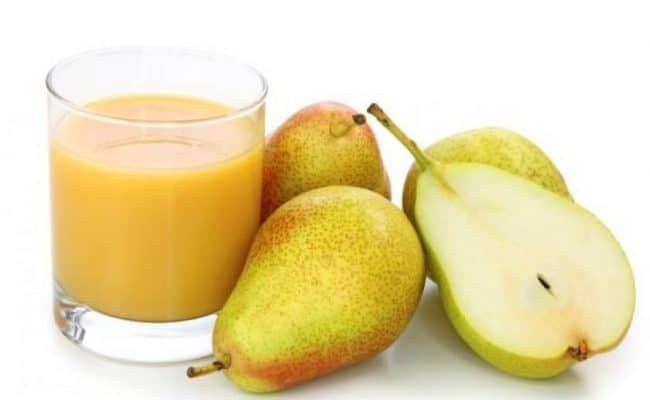
The most common eggplant, or aubergine, in the US is the brightly purple colored oblong eggplant. However, there are actually hundreds of variations of eggplants ranging in size, color and shape (1).
Eggplants are more common in other parts of the world like India where they have been harvested for centuries and incorporated into many native dishes.
The eggplant is actually considered a fruit, not a vegetable, even though it is served in savory instead of sweet dishes.
Eggplant can be served many different ways with many different cooking styles.
Eggplant is fairly neutral in taste, so it can pick up flavors from other ingredients. Fried eggplant is going to have a different nutrition profile compared to sautéed eggplant, for example.
Eating more eggplant that is not heavily cooked in oil can offer many benefits. Like all other fruits and vegetables, it is naturally low in calories and high in fiber, antioxidants, vitamins and minerals.
Studies (2) have shown increasing all fruit and vegetable intake can offer many health advantages such as lowering risk for cardiovascular disease.
Eggplants offers some unique health benefits, but keep in mind adding any fruit or vegetable to your food intake can be advantageous.
Antioxidant source
Eggplant is ranked in the top 10 vegetables for oxygen radical absorbance capacity (ORAC) (3).
The ORAC is one way to measure antioxidant levels in foods. Eating a diet high in fruits and vegetables is one way to increase your dietary antioxidant intake.
Antioxidants from foods may help lower risk for chronic diseases and protect cells from damage.
One antioxidant that purple eggplant is high in is the flavonoid group called anthocyanins.
Anthocyanins are responsible for giving fruits and vegetables their red, blue and purple hues.
Many studies have shown anthocyanins can have specific health benefits to the body, and research is ongoing to further understand how anthocyanins can benefit health.
According to research from the USDA (4), the components in eggplant that act as antioxidants can also give off a bitter taste.
So, the more bitter an eggplant may seem, potentially the higher the antioxidant level.
Lower risk of cardiovascular disease
A 2013 study (5) looking at data from over 93,000 women concluded a high intake of dietary anthocyanins may reduce risk for heart attack in young women.
A 2012 study (6) looking at data from about 1,900 women concluded a higher intake of anthocyanins was inversely associated with arterial stiffness.
This suggests eating a diet with high anthocyanin intake may help lower risk for high blood pressure or hardening of the arteries.
Based on these and other studies, eating more foods rich in anthocyanins, like purple eggplant and berries, may help lower risk for cardiovascular disease.
Benefit for blood sugar
Eggplants may offer a unique benefit for blood sugar regulation.
In fact, according to a 2008 study (7), the National Diabetes Education Program of the NIH, Mayo Clinic and the American Diabetes Association suggest eating a diet high in eggplant may be helpful for managing type 2 diabetes.
What makes eggplants helpful for blood sugar regulation?
Eggplants are high in fiber and relatively low in carbohydrates.
In vitro research has also shown components in eggplants may further aid in blood sugar regulation by inhibiting certain enzymes and offering protection to cells from oxidation stress (8).
More research is needed for eggplants and how they can influence blood sugar, type 2 diabetes risk and management.
Anti-inflammatory and cancer fighting properties
Because eggplants are a good source of anthocyanins and other antioxidants, they can offer anti-inflammatory benefit to the body.
Cell, animal and human studies have shown anthocyanins to have anti-inflammatory and anti-carcinogenic properties (9).
A specific compound in eggplants called chlorogenic acid has also been shown to exhibit anti-cancer properties (10).
Cognitive function
Vitamin B6 is a vitamin needed for over 100 enzyme reactions in the body (11).
Getting adequate daily intakes vitamin B6, folate and vitamin B12 can help lower risk for cardiovascular disease because these B vitamins help lower blood homocysteine levels.
Poor intake of vitamin B6 may also be a factor in cognitive decline in the elderly population, as some studies have shown an association between vitamin B6 intake and brain function in the elderly (12).
Eggplant is a source of vitamin B6; a cup of diced eggplant provides about 5% DV for vitamin B6.
Along with providing B6 for cognitive function, eggplant also contains something called nasunin. According to Medical News Today (13), some animal research has shown nasunin from eggplants may protect brain cell membranes from damage.
Anthocyanins may also help stimulate blood flow to the brain.
Fiber source and low in calories
Eating a diet high in fruits, vegetables, whole grains and legumes is not only beneficial for lowering risk for certain chronic diseases, but it may also aid in weight regulation (14).
Eggplant, like other fruits and vegetables, is low in calories and provides fiber.
A cup of diced eggplant provides only 20 calories and 10% DV fiber.
Just keep in mind the way eggplant is cooked can influence the nutritional profile.
Breading and frying eggplant can add a lot of calories to this naturally low calorie food. Lightly sautéing or baking eggplant can be lower calorie cooking methods.
Is there any harm in eating eggplant?
Eggplants belong to the nightshade family. Foods in the nightshade family contain a compound called solanine.
Some theories suggest eliminating foods in the nightshade family may be beneficial for certain health conditions such as arthritis, although research is not sufficient to support this theory (15).
Speak with a dietitian and your healthcare team if you are wondering if eggplant and other foods in the nightshade family are recommended for you.
People prone to kidney stones may want to follow a low oxalate diet.
Eggplants, spinach, beets and nuts are just some examples of foods that contain oxalates.
If you are at risk for kidney stones, a low oxalate diet may be recommended which would limit intake of eggplant and other oxalate foods.











